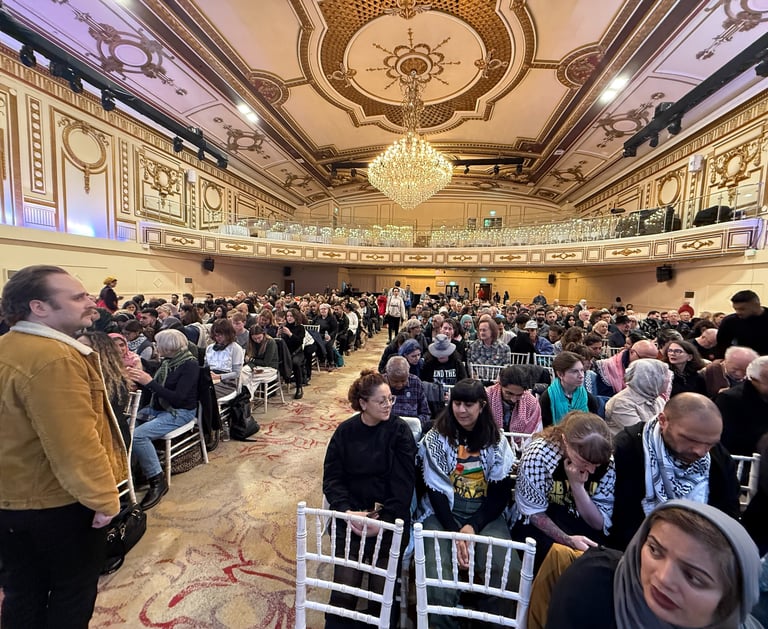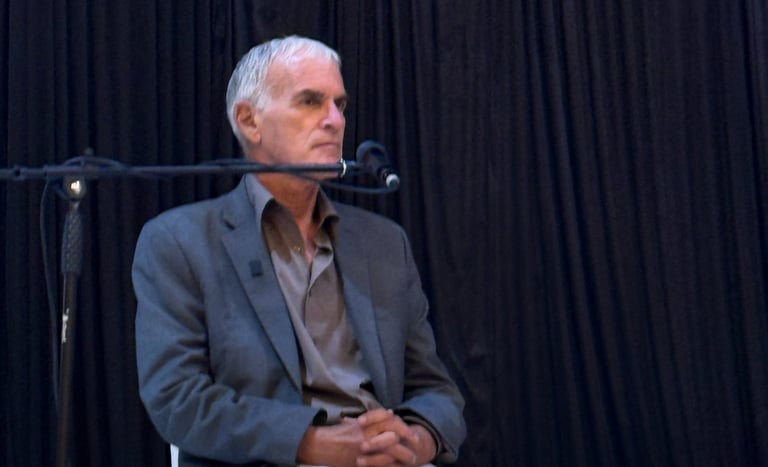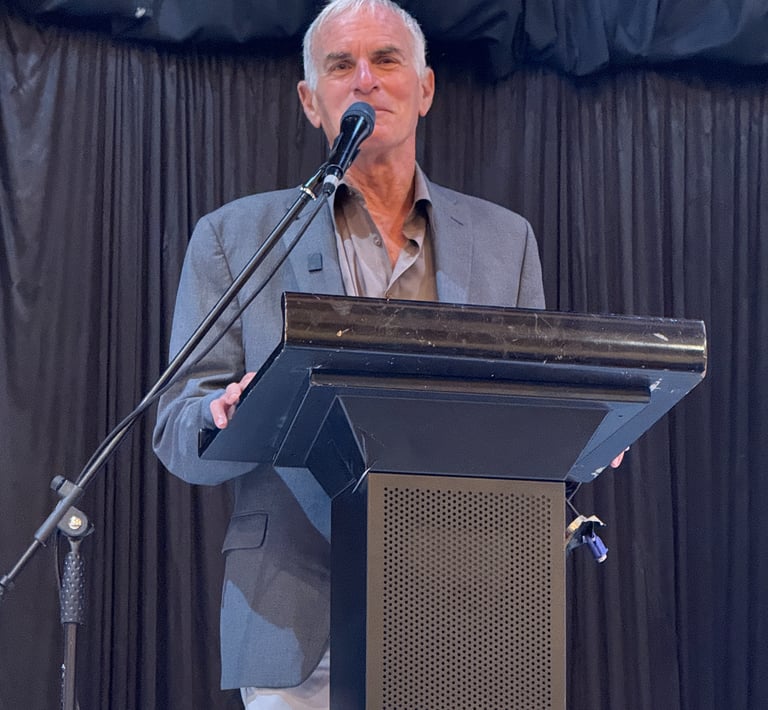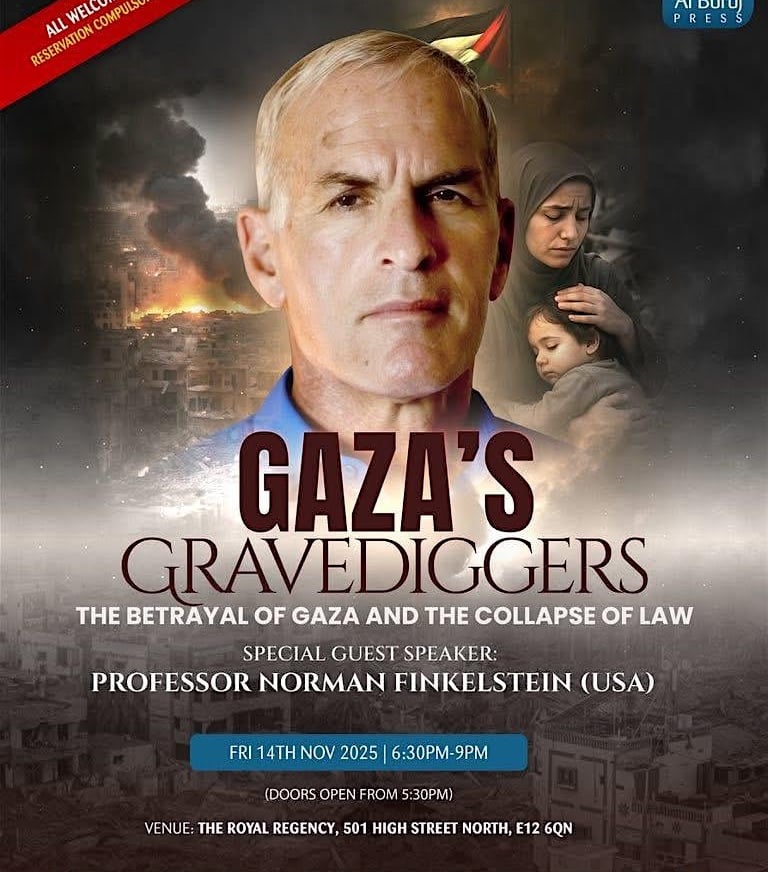Prof. Norman Finkelsteins' Talk: Gaza's Gravediggers, The Collapse of the Law
Notes from the talk.
11/15/20258 min read
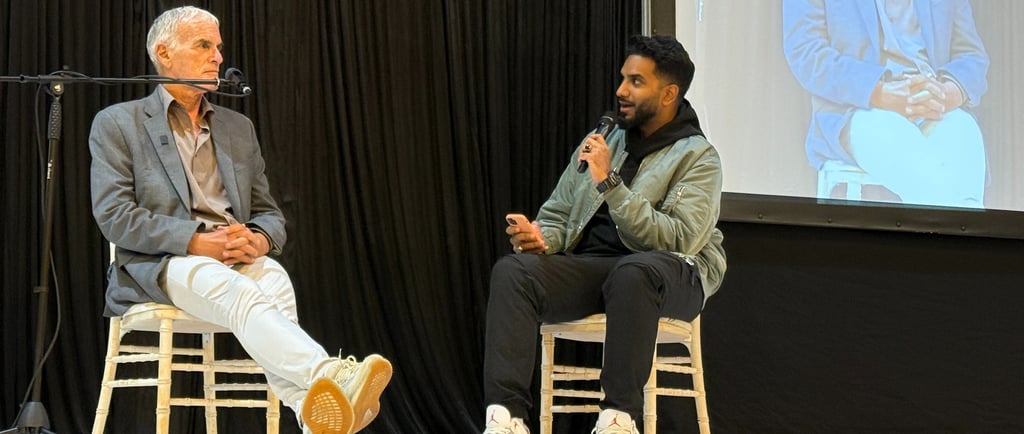

Prof Norman Finkelstein
I attended Gaza’s Gravediggers: The Betrayal of Gaza and the Collapse of Law, an event hosted at The Royal Regency with Professor Norman Finkelstein as the keynote speaker. The atmosphere was emotional and electric, a room full of people who refuse to look away from Gaza. Prof. Finkelstein spoke with his usual sharpness and moral clarity, breaking down October 7th, the siege, the question of genocide, and the wider geopolitical landscape. Below are my structured notes from the talk.
Began by answering the following questions:
1.) Piers Morgan’s favourite question – do you condemn Hamas?
On Oct 7th 1200 people were killed, of which 400 were combatants. Should Hamas be condemned for this? Objectively speaking, we can all agree that a high number of people were killed, so it was a horrible event. However, it cannot be looked at in isolation. Gaza is a concentration camp. Hamas won the democratic election, and Israel did not want this “wrong group” to be voted in, so it collectively punished everyone in Gaza by enforcing a blockade/siege. This means nothing gets in or out of Gaza without the permission of Israel – they still maintain their control. This is not democracy. They did not want to draw attention to starving people in Gaza, so they only allowed the humanitarian minimum of calories in for each person, just 1 degree above starving, so it doesn’t look bad in the press. It is to show their control if the wrong group are voted in. They even banned a long list of items from entering Gaza, such as chocolate, spices, condiments and even potato chips. Gaza’s economy has been completely destroyed, 80% percent of the population were living off handouts. 60% of the youth are unemployed. Usually, people leave areas like this to go and look for work elsewhere, but in Gaza, they cannot leave; they are trapped. Israel “mows the lawn”, the periodic carpet bombing of Palestinians in Gaza in their confined space. Each killing spree has its own operational name – Operation Cast Lead in 2008 /9 etc.. Here, 3250 children were killed, and many buildings were destroyed. Each time we think it can’t get any worse, but it keeps reaching an even lower point. Now 20,000+ children have been killed.
The media makes it look like everyone has been talking about Gaza, but this is untrue. There was talk that Saudi Arabia may join the Abraham Accords, which would normalise ties with Israel. The actions of Hamas brought Palestine back into people’s minds and the media. Their actions are very similar to the US slave rebellion; you cannot tell a slave off for rebelling against their master who is keeping them oppressed.
You cannot persuade people who already have their minds made up about something.
2.) What should Israel have done after Oct 7th?
Israel did not engage in “self-defence” it was a genocide. Israel does not target the perpetrators of the Oct 7th Hamas; instead, it targets all civilians by indiscriminate killing. If any Hamas members were killed, it was only by chance. This is not self-defence, and it is not a war. In a war, the aim is to take out the adversary’s military, in this case, that does not exist.
The law and morality do not coincide. For example, if a woman is being beaten by her husband for many years and one day she decides to hit back and he stabs her and kills her, did he have the right to self-defence or should it have been forfeited? You cannot just look at that one moment in isolation you have to take into consideration the 2 years of abuse.
3.) Was what Hamas did a disaster?
Hamas tactically planned what happened on Oct 7th, but not strategically. It was a roll of the dice to get Palestine back onto the world stage. The Palestinians have tried everything else to resist, peaceful protests, etc This was the final option, but it did turn out to be a disaster. It is much like the 1943 Jews in Warsaw who thought they were being resettled in the East, but in fact they were being terminated. The Jewish Fighting Force led the Jewish uprising at this time. They knew they could not win against the Nazi, but they wanted to die fighting. There is no doubt that their action accelerated the death and destruction, but people were in a desperate situation and wanted to die on their feet and not on their knees.
Even in the US now, the Nat Turner rebellion is honoured. It’s always seen differently in history than in real time. The uprising caused the slave masters to tighten their oppression, and they began to kill random black people on the streets. Things got much worse. However, when you ask the slaves, they spoke positively about the rebellion because they understood his reasoning.
There is what people are destined to be against what they want to be.
So what Hamas did was not stupid, but the actions of desperate people who did not see any other option.
4.) Is Israel committing a genocide in the technical term (the 1948 convention definition)?
Genocide isn’t just the mass killing of people; there has to be some demonstration of intent to do so. Israel killed Palestinians as a form of revenge, to uphold their belief that Jewish lives are more precious than Palestinian ones. It was Amalek – killing for revenge.
The point was to restore fear into the Arab world and anyone else who tried to stand up against Israel, to show what would happen to them, and not to get any other crazy ideas. It was to teach them a lesson.
Israel no longer wanted to carry out smaller operations; they wanted to perform the main goal of ethnic cleansing and move Palestinians to Northern Gaza, but it did not work, so the next move was to make Gaza unlivable. Either they stay and stave or leave. The mean was Genocide. Many people argue that if Israel wanted to destroy Gaza, it would have done so already, but it isn’t that easy. There are repercussions – for example, they can’t just nuke Gaza; there are laws and restraints.
Israel has killed hundreds of thousands of children, journalists, medics, etc It has got away with this; there is no other comparison in the world. There have been more children killed in Gaza in one month than in a whole year of the Syrian war. 1/4th of the Gaza population has been killed.
Many human rights organisations, such as Amnesty International, have come to a consensus that this is a genocide.
There are more Jews in New York than in Tel Aviv. Young Jews in the USA are most focused on Gaza, even 40% of them believe this is a genocide.
5.) Other thoughts
Just like when Hamas have been elected in Gaza, there is a sentiment that Zohran Mamdani has been the wrong person to be elected, and now, in the same way, the people who voted for him will need to be taught a lesson. Plato’s Republic talks about a small percentage of people who believe they are elite and should run society, the “philosopher’s King’ who knows what's best for everyone – they are the ruling elites. He may say he is the people’s mayor, but will not be seen as the representative for the billionaires. He has decided to keep the NYPD commissioner Jessica Tish, who is a billionaire; this would go against him in the future. Every so often, there is an intifada where the common people rise up, and this is not a communist ideology; it is a reasonable idea.
Regardless of your thoughts on the Houthis, they were the only ones to rise up for Palestinians because they have not been “civilised”. Saudi Arabia’s blockade of Yemen caused 100,000 children to die, so they know what the people in Gaza are going through.
Refined Notes from the Talk by Prof. Norman Finkelstein
1. “Do you condemn Hamas?” — Piers Morgan’s favourite question
On 7 October, 1,200 people were killed, including roughly 400 combatants. It was undeniably a horrific event, but it cannot be isolated from the broader context.
Gaza functions as a concentration camp: Hamas won democratic elections, Israel disliked the result, and imposed collective punishment through a blockade.
Nothing enters or leaves Gaza without Israeli approval. Even basic consumer items chocolate, spices, condiments, crisps — were banned to maintain control.
Israel allows in only the bare humanitarian minimum of calories to avoid photos of starving people leaking to the media.
Gaza’s economy was deliberately destroyed: 80% of people depend on aid, 60% of young people are unemployed, and no one can leave to find work.
Israel regularly “mows the lawn” — periodic large-scale bombardments in a confined space.
Operation Cast Lead (2008–09): 3,250 children killed, widespread destruction.
Each round reaches a new moral low. Today, 20,000+ children have been killed.
Finkelstein argued that Hamas brought global attention back to Palestine, just as enslaved people in the US rebelled — you cannot scold the oppressed for resisting their oppressor.
“You cannot persuade people whose minds are already made up.”
2. What should Israel have done after October 7th?
Israel did not act in self-defence — Finkelstein called it a genocide.
Israel did not target October 7th perpetrators; civilians were killed indiscriminately.
Any Hamas fighter killed was “by accident, not strategy”.
This was not a war. Wars involve destroying an opposing military — something Gaza does not have.
Morality and law are not the same:
Example: a wife abused for years hits back; the husband kills her claiming self-defence.
You cannot isolate the single moment — the history of abuse matters.
The same logic applies to Gaza.
3. Was Hamas’ action a disaster?
Tactically planned, but not strategically.
A desperate gamble to force the world to confront Palestine again after exhausting all other methods of resistance, including peaceful protest.
Finkelstein drew parallels with:
1943 Warsaw Ghetto Uprising — Jews who knew they couldn’t win but refused to die passively.
Nat Turner’s rebellion — brutal consequences followed, but enslaved people later described it positively because they understood its purpose.
People act out of what they feel destined to be, not what they ideally want to be.
In his view, Hamas acted not out of stupidity, but desperation.
4. Is Israel committing genocide according to the 1948 Genocide Convention?
Genocide requires intent, not just mass killing.
Finkelstein argues Israel’s intent is clear:
Revenge killings — tied to the biblical concept of Amalek (killing for revenge).
Restoring fear in the Arab world to deter future resistance.
Teaching Gaza a “lesson” for voting “wrongly”.
Israel attempted ethnic cleansing by pushing Palestinians into northern Gaza; when that failed, the goal shifted to making Gaza unliveable: stay and starve, or leave.
Israel can’t simply wipe Gaza off the map (e.g., nuclear weapons) due to international constraints — but its aims remain genocidal.
Casualty scale:
Hundreds of thousands killed, including journalists and medics.
More children killed in one month in Gaza than in a full year of the Syrian war.
Around a quarter of Gaza’s population killed or missing.
Consensus among major human rights bodies, including Amnesty International: this is genocide.
Young American Jews are turning — around 40% believe Israel is committing genocide.
5. Other Notes
Finkelstein compared it to the backlash against voters who elect “the wrong person,” such as Zohran Mamdani in New York. The elite feel the public must be “taught a lesson.”
Referenced Plato’s “Philosopher King”: a small group who believe only they should rule.
Criticised New York’s leadership for keeping billionaire police commissioner Jessica Tish.
Intifadas happen when ordinary people rise up — not a communist idea, but a human one.
He noted that regardless of opinion on them, only the Houthis materially acted for Gaza — because they have experienced similar suffering (Saudi blockade causing the deaths of 100,000+ Yemeni children).
Those who survive that kind of pain recognise what Gaza is enduring.
